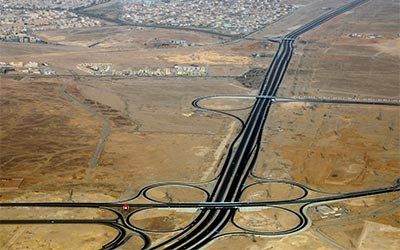Demolishing Egypt
Karim Ghassan, Nazlet El-Semman, EgyptThursday 15 July 2021

Controversial autocratic President Abdel Fattah al-Sisi came to power in 2013 after a military coup. Global Insight reports on his latest policy – involving lucrative redevelopment contracts with developers from Kuwait, Saudi Arabia and the UAE – which is having devastating human consequences.
Header pic: The site of a new skyscraper, which is being built in the New Administrative Capital in Cairo, Egypt. 8 March 2021. REUTERS/Mohamed Abd El Ghany
Residents of Nazlet el-Semman, which sits at the foot of the famous Giza pyramids, point to a new ominous mark on their front doors: oversized numbers written in red paint by city officials. Homes of the villagers – who for generations lived here with their camels and horses peddling rides around the monument for tourists – are now targeted for demolition.
‘Have they given you a number, Sheikh Abu Youssef?’ shouts one woman from a second-floor balcony to an elderly man stepping out of the mass Friday prayers in a mosque near her house. ‘Yes’, he shouts back. ‘They came and put the red marks […] our house too will be demolished […] everybody will have to go.’
This village will soon join an expanding list of dozens of other prime locations all over Egypt that the government of President Abdel Fattah al-Sisi has turned into heaps of red bricks, fragmented concrete and splintered wood in the name of ‘development’ and ‘progress’.
Ever since he came to power in a military coup in 2013, Sisi has made a brand for himself. Residents in zones deemed for development are warned to leave their homes. And if they resist, they are forcibly evicted. Their homes are expropriated and razed to the ground, with land ownership transferred to authorities who then replace them with new developments marketed at astronomical figures.
Development or money
The most recognisable of those zones is the Maspero Triangle, in the heart of downtown Cairo. Now metal cranes are helping construct high-rise concrete buildings, replacing the shanty town whose residents owned and lived on the land for generations but were among the first to receive Sisi’s unflinching expropriation policy. The area will be home to new hotels, restaurants, office buildings, malls and tourist facilities.
Lucrative redevelopment contracts that are mostly financed by foreign borrowing, high official fees and taxes go to the military’s real estate arm, often in partnership with well-funded local and regional developers from Kuwait, Saudi Arabia and the UAE.
They came and put the red marks […] Our house too will be demolished […] Everybody will have to go
Sheikh Abu Youssef
Resident of Nazlet el-Semman, Egypt
Former residents of the Maspero Triangle report that they were given compensation of a maximum of EGP 7,000 ($447) per square metre when the real market value can fetch up to EGP 100,000 ($6,392). The area not only borders the Nile on its west side and downtown Cairo on both other sides, but it sits a stone’s throw from luxurious hotels like the Nile Ritz-Carlton, Ramses Hilton and landmarks such as the Egyptian Museum, the Ministry of Foreign Affairs and nearby TV and media buildings.
Before evicting the residents of the Maspero Triangle, Egypt’s then Housing Minister Mostafa Madbouly, who is now the Prime Minister, told the media that homeowners had only few options. ‘Either they sign [an agreement to leave] and become partner to the progress with the State or choose to stop the development and in this case, or the government will move to expropriate and then evict them in accordance with the law’, he said at the time.
Bulldoze, bulldoze, bulldoze
The wave of bulldozing has swept over both rich and poor areas across this country of 100 million people, including wealthy, green suburbs that stand in the way of Sisi’s cement ambitions. Residents of Heliopolis, the area adjacent to Cairo International Airport, recently witnessed what they dubbed the ‘tree massacre’ where thousands of trees – some dozens of years old – were levelled to make way for concrete flyovers, new asphalt and re-districting plans that allow for better connections to Sisi’s pet project: a fortified new capital city in the desert. The desirable area of Almazah has also seen eviction orders in late July. Residents were told they will have to leave their European-style building blocks to make way for a wider thoroughfare, which is already 18 metres wide.
Agricultural land in the Nile Delta and Upper Egypt are being confiscated to make way for major toll roads run by the military, hosting coffee shops and gas stations, all owned by the Egyptian Ministry of Defense. Bulldozers, excavators and other heavy machinery is now a common sight in Cairo, lined up and ready to move into new areas and demolish homes and other buildings.
Either they sign […] or the government will move to expropriate and then evict them in accordance with the law
Mostafa Madbouly
Prime Minister, Egypt
On the receiving end of this wave of demolition are areas such as Istabl Antar, from which 3,000 families relocated and 800 housing buildings will be torn down. This comes after residents of Tawoon and Batn al-Baqara in Old Cairo and Tal el-Aqarab, near the country’s oldest mosque, all went through the same experience. Warraq Island will be converted into an ultra-modern city-island right on the Nile and is envisioned to offer pharaonic names such as Horus, a seven-star hotel, an international conference centre, a Nile boat marina as well as a helicopter pad.
Mahmoudia, Ezbet Nady al-Seid, Sidi Kirayr and the village of Sayadeen, in Alexandria, all with significant investment value, have been expropriated. In all, tens of thousands of families have been relocated with minimal compensation. Cairo residents, whose homes were not in prime locations and not of great value, joke in private conversations that they are lucky they are away from the avaricious gaze of greedy officials.
Common good
On 22 April 2018, Sisi ratified an amendment to the law regulating real estate expropriation for public benefit after his hand-picked members of parliament had rubberstamped it. Under Sisi, the law has been amended several times, allowing the authorities unchecked power to impose fines and penalties against those resisting such measures.
The Sisi government denies that there is any financial motivation behind all this. It maintains it is creating an improved living environment for Egyptian families away from ‘unsafe zones’ – the political jargon here is referring to poor areas. Such claims however are met with scepticism, given the track record and how Egyptians view their rulers.
Residents in many areas slated for demolition insist that they are being removed not for development but rather to allow the ruling military to make a real estate killing selling their much-coveted locations to cash-laden developers. And those who actually left complained that the compensation was not fair, didn’t take individual needs into account and didn’t include alternatives to jobs lost either.
Salah Mohammed, whose mechanic workshop was in the Maspero Triangle, located near spare parts shops and heavy traffic, has now moved to 6th of October city, a relatively new city some 50 kilometres south-west of his original location. ‘I like the clean air here’, he says of his new shop. ‘But customers are hard to come by. Nothing is like work downtown. I sit down and drink lots of tea here instead.’

An aerial view of the new mega highways and bridges on the way to the New Administrative Capital of Cairo, Egypt, 10 April 2021. REUTERS/Amr Abdallah Dalsh
Force in the air
Unlike Salah who merely put up ‘verbal’ resistance, the majority of residents forced into relocation took part in street protests. In mid-July the residents of Nady al-Seid, who number around 16,000, came out against a decision to transfer them from their village, which is spread over 51 acres. Some 60 people were arrested but later released. At least 13 remain in custody and face charges of ‘thuggery’, ‘demonstrating illegally’ and ‘destroying public property’. Security forces routinely video protests and later make visits at dawn to arrest leaders of the activities.
Authorities have mixed the ‘progress’ argument with the ‘illegal settlement’ rationale to justify the crackdown and to limit protections of private property rights. Yet rights groups say the realities on the ground show that the overwhelming majority of residents either owned their homes or the land legally with valid titles. Opposition groups in exile too have noted the current government’s behaviour, describing it as ‘identical to foreign occupation’ since the government seizes the property and then hands it to investors who make a profit later.
The Egyptian Commission for Rights and Freedoms (ECRF), one of the few independent groups that still operate in the country, issued several statements drawing attention to the plight of those residents and to rights violations.
Human Rights Watch says that home demolitions and forced evictions in North Sinai governorate, where Sisi is facing a low-grade insurrection, are ‘violations of international humanitarian law, or the laws of war’ and that between late 2013 and July 2020, the Egyptian military under Sisi destroyed at least 12,350 buildings, predominantly homes, most recently in the el-Arish area.
Business for the military
Critics say those plans are designed to benefit the military, now deeply involved in the country’s lucrative real estate market. On public TV in August 2020, Sisi threatened to deploy the country’s large military force, which receives aid from the US and buys extensively from European defence contractors, to villages resisting the measures to clear homes in the name of development. ‘If needed, I will order the Egyptian military to enter all villages. We either stand up and become a proper country or I will leave my position’, Sisi warned. ‘We bought engineering equipment that will be enough to send (with the troops) and annihilate all this.’ The ‘annihilate’ video clip went viral on social media leading to sporadic street protests in September 2020.
Ever since then, the military has resorted to an additional tactic. State-controlled media outlets increased their programming promoting relocation to ‘more humane living conditions’. Local reporters tell Global Insight that they have received orders not to cover the protests that often accompany this massive relocation effort, or to air residents’ grievances, in order to minimise public resentment, leaving locals to vent their frustration by using their phone cameras and posting footage on social media.
Furthermore, authorities say they never force anyone to evacuate and that they were all compensated handsomely and fairly. The country’s officials say what’s happening is neither ‘expropriation’ nor ‘eviction’ but an attempt to ‘replace shanty towns’ and give the country a more ‘civilised appearance’. Those who criticise the efforts are members of the banned Muslim Brotherhood, they say.
In such a context, the role of the legal profession is fundamental. Going back to the basics, we as lawyers have sworn to seek justice and to protect those who suffer from lack of it
Veronica Franco
Latin American Regional Forum Liaison Officer, IBA Poverty and Social Development Committee
Government-run TV, whose staff often refer to Sisi not by name but as ‘the political leadership’, says that it ‘has given unprecedented attention to the issue of new homes’. TV shows promoting the demolitions display a social media hashtag called ‘the New Republic’ and dub those leading the effort as ‘harbingers of good’.
Residents are transferred to housing blocks in Asmarat, in the desert east of Cairo, often described with fancy names like ‘fourth generation buildings’. According to the government agency running the evacuation efforts, there are at least 188 ‘non-humane’ areas that have been expropriated across the country with many more lined up.
Rights and legal help
Despite the arguments, experts say such an effort is an abuse of the rights of residents. Tara Archer-Glasgow, Co-Chair of the IBA Poverty and Social Development Committee, says such forced evictions under UN definitions could constitute gross violations of a range of internationally recognised rights, including the human rights to adequate housing, food, water, health, education, work security of the person, freedom from cruel, inhumane and degrading treatment and the freedom of movement.

Egyptian President Abdel Fattah el-Sisi after a meeting with the German Chancellor in Berlin, Germany, 3 June 2015. Shutterstock.com/360b
In the absence of legal options locally, the international arena can offer some reprieve through ‘appeals to international human rights bodies such as the United Nations to assist in highlighting their plight and appealing to other nations who are members of the various applicable treaties, as well as to NGOs, to apply pressure on their governments to cease such actions’, says Archer-Glasgow.
Veronica Franco, Latin American Regional Forum Liaison Officer of the Poverty and Social Development Committee, says the legal rights aspect of similar measures are often overlooked for political expediency. ‘Such a situation is overlooked, most commonly in developing countries,’ she says. ‘In such a context, the role of the legal profession is fundamental. Going back to the basics, we as lawyers have sworn to seek justice and to protect those who suffer from lack of it. Willingness to fulfill such a vow is necessary as a preliminary step. As a first step towards the equality of housing rights, visibility of the problematic is a key factor, together with the development of public policies and specific actions, in which the involvement of practitioners is necessary.’
Archer-Glasgow adds that pro bono services and information can mitigate the impact of such policies. ECRF says the authorities must start a dialogue with residents, fully compensate them with their consent and stop the use of force and the ill-reputed dawn arrests deployed against protest leaders. ECRF urged the authorities to respect the International Covenant on Economic, Social and Cultural Rights. ‘Before evacuating residents, the state must guarantee that all options have been discussed with those who will be impacted so as to avoid the need to use force’, the ECRF said in a statement.
Veronica Franco notes that the government’s role should be defined as offering rights to citizens and not seeking profit. ‘From a legal perspective, it should be understood that the role of the government is to ensure basic rights for its citizens. Understanding the fact that such basic rights outweigh any other interest is key in order to grant pre-eminence to public policies and public institutions aiming to fight such problems,’ she says.
Similar scenarios
In Paraguay, where similar situations arose as a result of infrastructure projects, some mitigation measures were taken, Franco notes.
‘The law aims to ensure a fair compensation for those who live in areas that are required for the development of infrastructure projects’, she says. ‘Currently, Paraguayan law does not grant any specific protection towards forced evictions, however, the Paraguayan government aims to mitigate the effects of such through expropriation processes under the mentioned law.’
Franco says that considering the socioeconomic context of Paraguay, there is a high rate of occupation, specifically in rural areas and mostly from indigenous groups. The high rate of occupation in Paraguay is a consequence of the socioeconomic context and the failure of the government to ensure the application of appropriate measures to mitigate such a situation. ‘This is a constant problematic, that in lucky cases has resulted in the expropriation of private land to the benefit of indigenous groups, however the situation remains’, she says.
Tara Archer-Glasgow, who is based in Nassau, the capital and largest city of the Bahamas, says the government’s actions have mostly focused on ‘illegal immigrants’ rather than on rightful owners of land or property. ‘The government of the Bahamas, through the Departments of Immigration and the Ministry of Works, have demolished homes, typically inhabited by illegal immigrants’, she says. ’The basis for demolishing these homes in the Bahamas have been due to their violation of our building codes and for trespassing on properties for which they have no legal title.’
She says even though there are set procedures in place which must be observed by the government before homes are demolished, it is presently, like in Egypt, a controversial issue and the subject of ongoing court action between government agencies and human rights groups. In Egypt, however, where Sisi’s despotic methods have left few NGOs standing, the action is likely to remain away from the courts, with the authorities challenged instead by people continuing to take to the streets.

Villagers in Nazlet el-Semman have offered tourists horseback rides to the pyramids for years. Now, they face forced relocation to make way for new roads and developments.



